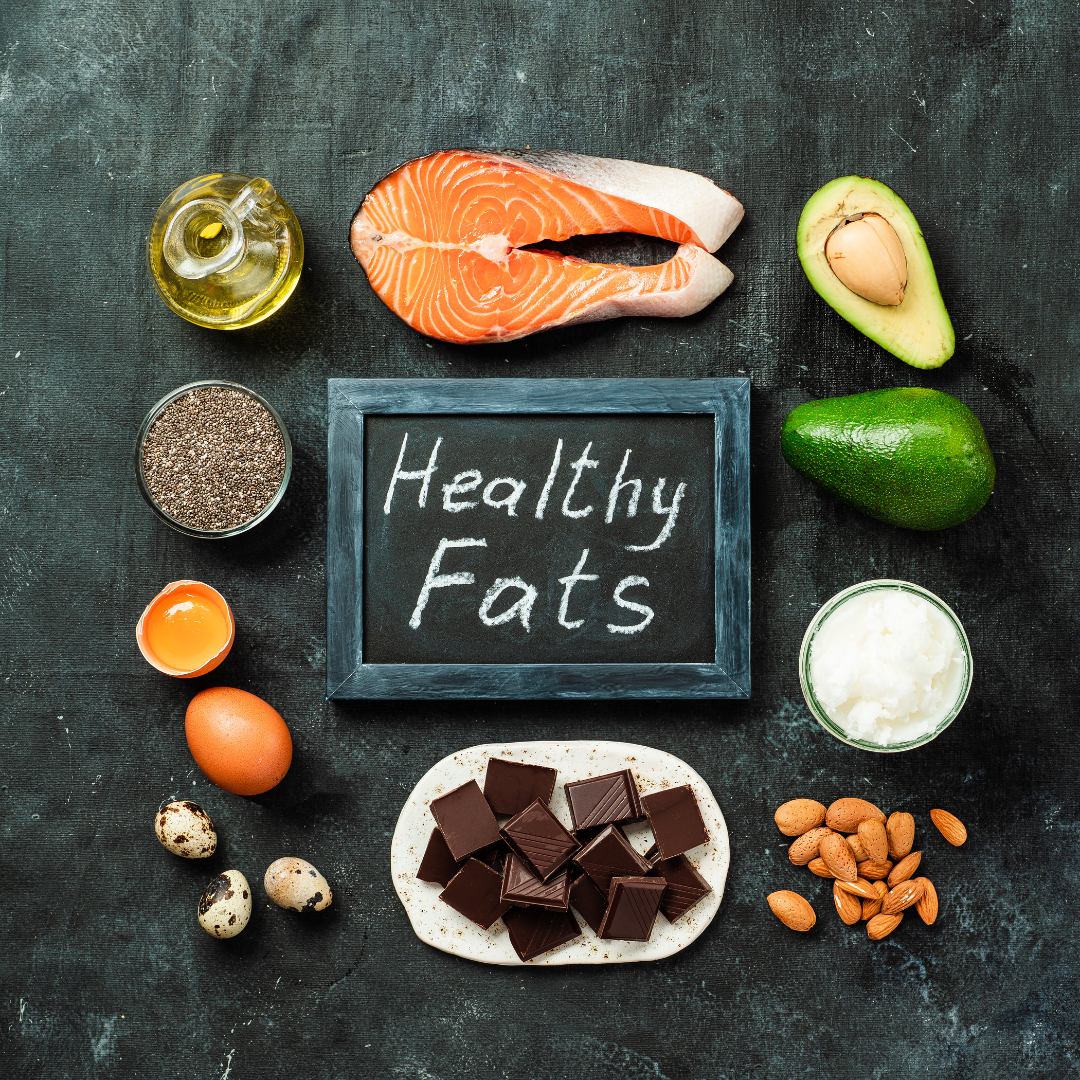Contrary to common belief, eating fats does not make us fat! We need fat for healthy hormones, a healthy brain, great skin and to reduce inflammation. Fats can also provide us with energy, and they help us feel full for longer so that we don’t end up snacking. However, it is important to realise that there is a distinction between healthy fats that help us to stay healthy and thrive, and those that don’t but instead cause inflammation and disease. Having said that, healthy fats are energy dense so if they are overeaten, they can still lead to weight gain – it’s all about balance!
Fats are broadly categorized as saturated, monounsaturated, and polyunsaturated fats. All three are naturally occurring fats, so they are found in common food sources.
Saturated fatty acids are a hydrocarbon chain with single bonds. They are solid at room temperature and don’t easily oxidise. They are often used for cooking, due to high smoke points. Saturated fats are often believed to be harmful, and they can be if eaten in excess or from non-quality sources. However, small amounts from a good quality source are beneficial for our health, in particular for healthy hormones, neurotransmitters and brain function.
Sources: butter, coconut oil and all dairy products (ideally organic and from grass-fed animals)
Monounsaturated fats are hydrocarbon chains with one double bond. This double bond means that they are not as stable and are liquid at room temperature (they solidify when refrigerated). They are often high in antioxidants and contain vitamin E (with the latter being important for skin health). Not all monounsaturated fats are great for cooking (for example nut oils) but some are fine to use because of their high antioxidant content, which prevents the oil from oxidising when cooking with it. Extra virgin olive oil is an example.
Sources: nuts, seeds, avocado, olive oil, avocado oil and sesame oil
Polyunsaturated fats have a hydrocarbon chain with two or more double bonds. Polyunsaturated fats/oils can be categorised into omega-3 fatty acids and omega-6 fatty acids – both are commonly referred to as essential fatty acids (EFAs). EFAs must be consumed from EFA-rich foods as the body can’t make those from other substances (refer to my blog on EFAs for more details). Broadly speaking, omega-3 EFAs are anti-inflammatory and omega-6 EFAs can be pro-inflammatory, if their consumption exceeds omega3 consumption. The typical Western diet is very high in omega-6 oils but low in omega-3 oils, and it is this imbalance leads to internal inflammation and chronic disease. So we do absolutely need both but we need to achieve a healthy ratio of both to avoid disease.
However, all polyunsaturated fats can oxidise easily and go rancid. It is therefore important that you choose a good-quality source and that they are stored in a cool, dark cupboard. They should not be heated but instead they can be drizzled over dishes or could be used in condiments like pesto.
Sources: walnut oil, hempseed oil, flaxseed oil (ensure that they are cold-pressed)
Sources of omega-3: oily fish such as salmon, tuna, sardines, mackerel, chia seeds, walnuts and flax seeds.
Sources of omega-6: grains, legumes, nuts & seed but it is also found in most non-organic or non-grass fed meats, seed oils (for example highly refined oils like vegetable oils, canola oil, sunflower oil), peanuts and all processed foods. This shows why it’s so easy to overeat omega-6 fats!
We now also have another fat category: trans fats. Trans fats are commercially made through a process called hydrogenation, where a polyunsaturated oil like soybean oil is injected with hydrogen. Hydrogenation makes these oils more solid and shelf stable, and as its inexpensive, the resulting product is cheap. Food manufacturers love these cheap and shelf-stable oils of course and use them to make margarine, processed foods, fast food and most commercially baked goods.
Whilst food manufacturers might love them, they are actually really bad for our health and should thus be avoided. The reason they are so bad for us is that they are chemically made, so that the body doesn’t recognise them and is unsure what to do with them. Over time these fats build up in the body, they can clog arteries and thus lead to heart disease. Studies* have shown that these fats raise LDL cholesterols (commonly known as the ‘bad’ cholesterol) and lower HDL (the ‘good’ cholesterol) and raise inflammation – all leading to heart disease.
Bottom line is, that we need all three types of fats, but consumption of unsaturated fats should exceed those of saturated fats and trans fats should be avoided.
* https://academic.oup.com/advances/article/11/3/697/5645621
* https://jofem.org/index.php/jofem/article/view/534/284284328

